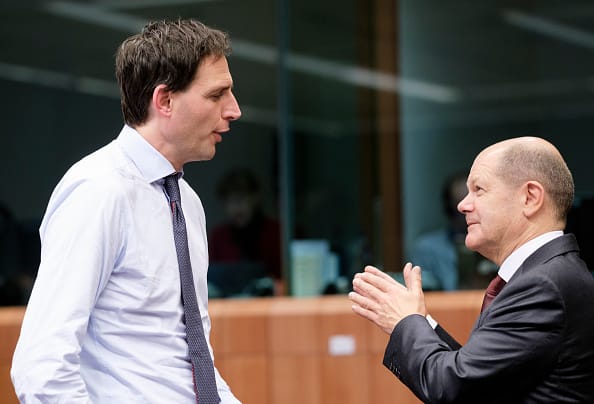BRUSSELS, BELGIUM – FEBRUARY 17: Dutch Minister of Finance, Wopke Hoekstra (L) is talking with the German Federal Minister of Finance Olaf Scholz (R) prior an Eurogroup (Inclusive format) Ministers meeting in the Jusuts Lipsius, the European Union Council headquarter on February 17, 2020, in Brussels, Belgium.
Thierry Monasse
Europe has been embroiled in another debate over debt mutualization — an issue that has resurfaced past divisions among northern and southern nations.
Germany and the Netherlands are the two most vocal opponents to the idea of so-called “corona bonds.” Another nine EU nations have said this new debt instrument, which would combine securities from different countries, is needed to mitigate the vast economic impact of the coronavirus pandemic.
The German and Dutch opposition has sparked a lot of anger among southern European lawmakers, in nations where the costs of the virus are set to exacerbate hefty debt piles.
Jean-Claude Trichet, former head of the European Central Bank, has called that division between north and south “counterproductive” and “useless.”
CNBC looks at why Germany and the Netherlands are against this idea of of ’corona bonds‘.
Populism at home
Anti-EU parties have experienced growing support in the wake of the sovereign debt crisis of 2011. These parties share the idea that their country’s membership of the European Union is not serving their citizens well. However, the rhetoric from these political groups can differ and often fuels the north-south divide.
In Germany, Alternative for Deutschland (AfD), which entered the German Parliament for the first time in 2017 and is now its third largest group, has spoken out against corona bonds. A spokesman for the AfD said neither the coronavirus nor the euro “justify that German taxpayers are bled for the debt of the whole EU.”
On the other hand, Italy’s most popular anti-EU party, Lega, led by Matteo Salvini, has started a fierce campaign against the idea of Italy accepting money from the region’s crisis fund, called the European Stability Mechanism. This is one of the possibilities being discussed by finance ministers to help economies dealing with the pandemic.
Claudio Borghi, a member of Lega, who was the economic advisor when the party was in government in 2018, recently tweeted an Italian Fascist-era poster with a smiling German soldier extending his hand, saying “Time goes on, but the tactics are always the same.”
Carsten Nickel, from the research firm Teneo, said in a note that “northern decision-makers face their own domestic political pressures, pulling them in a direction opposite to their southern peers.”
“For Germany and the north, jumping from the virus crisis directly to debt mutualization will simply not work politically,” Nickel added.
Fragile coalitions
The Dutch and German governments are also the result of fragile political alliances.
In Germany, Chancellor Angela Merkel joined forces with the socialist group SPD in the wake of the 2017 federal election. This deal came about only after Merkel’s CDU party failed to reach an agreement with two other parties.
In addition, the CDU and SPD coalition has been tested on different occasions since then, leading political analysts to weigh the prospect of a rupture.
Dutch Prime Minister Mark Rutte, a liberal politician, has been in coalition with three other parties since 2017 and also faces opposition from an anti-EU party in his national parliament. The Party for Freedom, under the leadership of Geert Wilders, is the second-largest group in the Dutch Parliament.
The ECB’s stimulus
The European Central Bank has announced a massive bond-purchase program, totaling 750 billion euros throughout 2020, in response to the ongoing pandemic. The move lowered borrowing costs for euro zone countries and reduced any pressure on policymakers to come up with another massive EU-wide stimulus package.
Thus, Dutch and German officials have highlighted that every euro country benefits from good market conditions, meaning they do not need to take the unprecedented step of combining European securities.
European governments are often criticized by parts of their electorate that they have given “too much sovereignty” to EU institutions.
This was one of the biggest arguments in the U.K., which led to the country’s departure from the bloc in January.
At the moment, the ECB oversees monetary policy across the 19 countries that share the euro, while the different capitals retain powers over fiscal policy.
The “flipside (of debt mutualization) would be permanent conditionality via more centralized fiscal policymaking,” Nickel from Teneo said.
“The political desirability of such a regime will be a big question to answer for Germany the north — but certainly also for the south,” he added.
